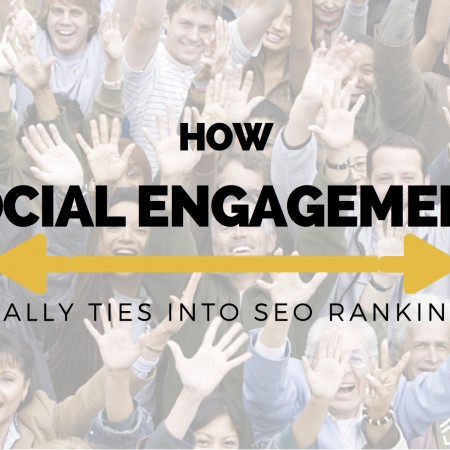How Social Engagement Really Ties Into SEO Rankings
If you run a business, there’s no doubt you’ve been told you need to be busy on social media channels. But, essentially you need to know that your efforts on those platforms are driving traffic to your website and making it quicker for customers to find you online. In short, you need to know you’re getting a return on investment. The question is this: do social signals actually influence your SEO? Social Engagement and SEO: The Answer Is Indirectly Last year, Matt Cutts announced that social signals won’t directly affect SEO. Sounds pretty cut and dry, right? Wrong. The keyword in that sentence is “directly.” Social media allows you the chance to impact your business’s SEO in an array of indirect ways. How to Measure That Indirect Impact Just because you can’t tie the indirect impact of SEO and social signs doesn’t mean it’s time to pack up shop and shut down all your social profiles. While there may not be a very specific formula for directly connecting SEO and social, it definitely doesn’t mean your social effort are futile. Let’s say you have a ton of followers on Twitter. That doesn’t really guarantee that you’re going to enjoy higher ranks on Google and the other search engines. However, it also doesn’t mean that won’t change tomorrow. For instance, in 2013 Google said that they did include social signals. A year later in 2014, they said they did not. According to Justin Kirby, CaveSocial Co-Founder, if a business’s content tends to be drawing people from various social networks to your URL constantly, SERPS are going to view your content as respected and eventually your rankings will increase. Social Is Much More than SEO Rankings Increasing your business’s website rankings in search engines really shouldn’t be your only goal when it comes to social signals. Just look at these other benefits: Link building Increased website traffic Social profile growth Content visibility Each of these can, and will, contribute to increased rankings. Gone are the days of SEO just being about using keywords and link building. That’s exactly why Google’s algorithm continues to evolve. Now, SEO revolves around honest experiences and trustworthy brands which means your rankings get better as you provide quality content, delivered consistently from a variety of sources. When you create a marriage between your social and content, you’ll see how your ranking and website traffic will improve. Let’s not forget about social reputation and brand awareness, either. As stated in Searchmetrics’ 2016 Rebooting Ranking Factors White Paper: “The correlation between social signals and ranking position is extremely high, and the number of social signals per landing page has remained constant when compared to with the values from last year’s whitepaper. … The top-ranked websites in Google’s rankings displays vastly more social signals than all other pages…. This is primarily due to the overlap between brand websites performing strongly in social networks and being allocated top positions by Google.” Essentially, the more ways people are able to find you in search engines, the more you’re able to control your brands’ images. Simply open the first few pages of Google on a search of your product or brand. Be consistent in your efforts and you’ll be able to “own” some topics online with your killer content and, ultimately, your services and products. So Many Reasons to Be Active on Social Media While there may not be a clear recipe of what you should be doing on social for your efforts to affect SEO, that doesn’t mean social signals won’t affect SEO whatsoever. There are plenty of reasons to be active on social, like engaging one-on-one with customers and growing your community. All the growth and social activity to see on your networks will lead to increase website traffic, increased interest in your offerings and more content views. SEO Is Becoming More Dependent on Engagement Human marketing, that is, having an online presence and engaging with your community, is good for all sorts of reasons. It’s especially good for your bottom line. Search engines are hard at work building algorithms that are way more in tune with human thinking since at the end of the day, humans are the ones using the search engines. So the closer they get to being human, the better the results will be. But don’t just take my word for it. Searchmetrics created a list of correlating factors between social signals and search engine positions. What you can see here is that 8 out of 10 highest correlations between search engine positions and rankings are tied to social engagement factors. That means that those factors that tie in best with the search engine positioning is related to how people react to content on social media. Human beings’ reactions on social media don’t happen because of numbers or because you’ve created a perfect site (from a technical viewpoint). It does happen because your content appeals to your audience; it resonates with them; they can relate. They’re human! We could get into a whole heated debate about a link between causality and correlation. But there’s really one main thing we need to know: content that is likely to entice engagement has a better chance of higher rankings and content that ranks well will help your bottom line. Matt Cutt’s Viewpoint So, just how far is Google from using social media signals as factors for ranking? Can the SERPS use follower and engagement metrics from the likes of Facebook and Twitter to evaluate an individual’s authority? The answers to those questions were certainly buried in the headlines in Matt Cutt’s video. Supporting what Matt had to say, Google’s John Mueller has categorically stated Google doesn’t use social signals in its search ranking factors. Okay, so let’s go in depth into Matt Cutt’s comments to try to understand why Google doesn’t do so. Do Twitter and Facebooks Signals Play a Part in Google’s Ranking Algorithms? That’s what Matt Cutts answered in the video. Let’s break it down. 1. Twitter and Facebook … Read more



